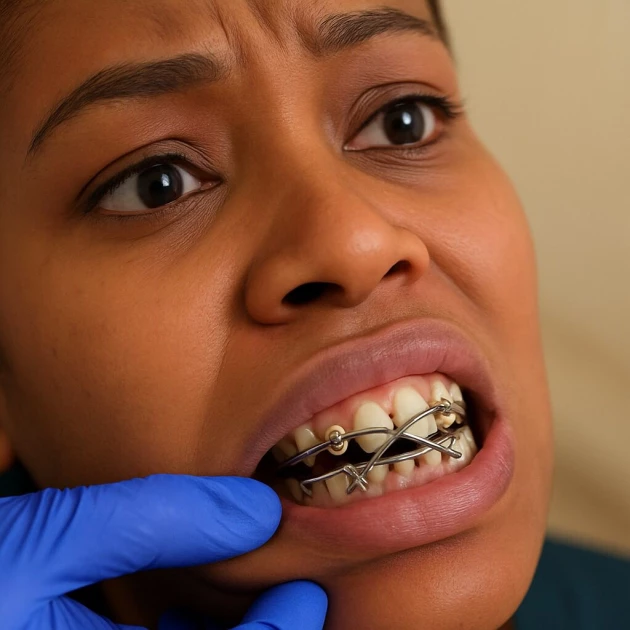Wired for beauty: Inside the jaw wiring craze sweeping East Africa

Originally a medical procedure used to treat jaw fractures, it is now being repurposed in a surprising and controversial manner: as a shortcut to slimness.
Originally a medical procedure used to treat jaw fractures, it is now being repurposed in a surprising and controversial manner: as a shortcut to slimness.
Increasingly, women in urban areas are opting to have their jaws wired shut, not to heal an injury, but to shed weight rapidly.
Costing between KSh 15,000 and KSh 40,000 in select private clinics, jaw wiring forces individuals onto a liquid-only diet, effectively turning the mouth into a cage in the name of beauty.
Social media influencers like Moniq Diary have popularized the trend, claiming significant weight loss—up to 7 kilograms. Others, such as Redna Ray, have documented their experiences online, presenting the decision as bold, yet effective.
But this is more than a cosmetic choice. For many, it is the culmination of years under the microscope of societal scrutiny—years of body shaming, unsolicited comments, failed diets, and the relentless pressure to conform to a particular standard of beauty.
The issue extends beyond appearance and delves deep into one’s sense of worth.
This trend isn’t isolated to Nairobi. Similar stories are emerging in Kampala, Dar es Salaam, and other East African cities, where global beauty ideals clash with local cultural expectations.
The movement has sparked serious questions about the physical toll and psychological cost of such interventions. Is it safer or more harmful than other weight-loss methods?
Global health authorities, including the World Health Organization (WHO), have raised concerns over extreme, non-medical weight loss procedures, warning of severe nutritional deficiencies, psychological trauma, and potential eating disorders.
When used outside its intended medical context, jaw wiring is not only controversial—it’s dangerous. Without proper psychological counseling and nutritional supervision, the emotional and physical damage can run far deeper than any mirror can reveal.
In Kenya, the Medical Practitioners and Dentists Council (KMPDC) has yet to issue an official stance on the cosmetic use of jaw wiring.
Nevertheless, medical professionals continue to voice growing concern, particularly over its appeal to young people influenced by heavily curated online beauty standards.
A Nairobi-based doctor, speaking on condition of anonymity, explained that jaw wiring involves immobilizing the upper and lower jaws using orthodontic wires or elastic bands.
This restricts food intake, leaving patients reliant on liquids or pureed foods and leading to rapid weight loss. According to the doctor, most of the women seeking the procedure are under immense pressure to lose weight quickly, often in preparation for weddings or other social events.
He noted that while jaw wiring is sometimes used as a temporary intervention for patients at risk of obesity-related complications, its appeal in cosmetic settings is troubling.
The procedure’s benefits include minimal invasiveness, quick reversibility, and rapid results—some patients report losing between 5 to 20 kilograms in just six weeks.
The upfront cost is relatively low, and some women experience a boost in confidence after initial weight loss.
However, the risks are substantial.
A liquid-only diet can easily lead to malnutrition unless it is carefully balanced with essential nutrients. Poor oral hygiene during the wiring period increases the risk of dental decay, particularly when sugary drinks are consumed.
More concerning are the psychological effects: jaw wiring can reinforce obsessive thoughts about body image and perpetuate body dysmorphia.
Many patients, even after the wires are removed, continue to feel dissatisfied with their appearance. Moreover, because the behavioral changes are often unsustainable, most people regain the weight once the wires come off.
When compared to other weight loss options, experts stress that jaw wiring does not offer the long-term benefits seen with more sustainable interventions like bariatric surgery, which includes behavioral and nutritional support.
Diet and regular exercise, they maintain, remain the safest and most effective path to lasting wellness.
“Quick fixes may seem appealing,” the doctor emphasized, “but they often carry long-term consequences that far outweigh the temporary results. True wellness is built over time—not wired into place.”
He urged individuals struggling with body image to seek psychological counseling, adding, “Healing begins from within—not just by changing your body, but by understanding your relationship with it.”
Want to send us a story? SMS to 25170 or WhatsApp 0743570000 or Submit on Citizen Digital or email wananchi@royalmedia.co.ke
Comments
No comments yet.


Leave a Comment